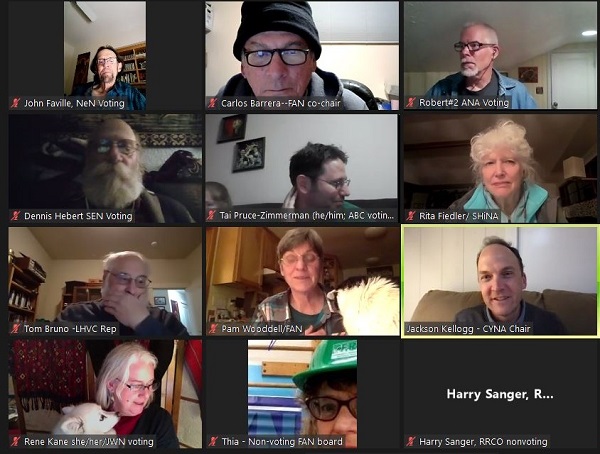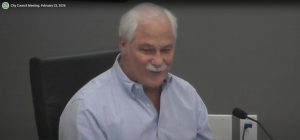Neighborhoods ‘put the moose on the table,’ express distrust with City
8 min read
Is the City planning to dismantle its neighborhoods? At the April 26 NLC meeting, Pam Woodell.
[00:00:08] Pam Wooddell (Friendly Area Neighbors): It’s certainly something I’ve worried about in Portland and Seattle, and especially after what I’ve seen happened with HB 2001 here.
[00:00:18] Rene Kane (Jefferson Westside): I’ll just put the moose on the table as Jon Belcher did in our advisory meetings. There are cities that are completely eliminating their neighborhood organization programs. They are removing funding, they’re removing recognition, et cetera, and that has not gone unnoticed in this community. And so I hope you, as staff, can understand why people are nervous and cautious.
[00:00:45] I come from inside your organization and I know that there are staff that would like to see neighborhood associations disappear, because we’re whatever, fill in the blank. So that’s where I’m coming from.
[00:00:59] As somebody who participated in the Advisory Committee, asked a lot of hard questions—you could ask Robert, I had a few moments there where I was pretty outraged—and I think you all need to be real straight with us.
[00:01:15] Jackson Kellogg (Cal Young / NLC Chair): I think this is an attempt by the city to break down the neighborhoods and to focus on groups that are not based on geography. And I think we need to think about this as neighborhood leaders.
[00:01:30] Fabio Andrade (Human Rights and Neighborhood Involvement Manager): Jackson, this is a statement of opinion and it is not what we’re trying to do.
[00:01:34] Jackson Kellogg: No, it’s a statement of fact because of what you just said. So you said that in your own words.
[00:01:39] John Q: The exchange came during a briefing from the City’s Robert Brack.
[00:01:43] Robert Brack (Neighborhood Involvement): This started by staff looking at current inactive neighborhood associations. A lot of you are very familiar with these areas and their current status. So we have the Industrial Corridor, Trainsong, West Eugene Neighborhood Association, Far West Neighbors, and West University Neighborhood Association.
[00:02:02] And there’s about 9,000 residential addresses, that’s not counting the business addresses. So how are these residents being connected or have the opportunity to be connected to active neighborhoods and get the benefits of having active neighborhood associations? And there aren’t a whole lot of policies that help address that situation.
[00:02:23] There’s some other needs too. The City is moving towards program-based budgeting; that was introduced to City Council. And reviewing our services and what neighborhood associations need, it’s good timing for this.
[00:02:38] And so we put it out there to neighborhood associations, to help us, advise us, HRNI staff, on an engagement process. And so we did that. We had one meeting in February and then a lot in March. And based out of those meetings, we drafted some guiding questions that could help guide this project:
[00:02:57] How to better promote and sustain community engagement through neighborhood associations? How to increase involvement of renters and members of marginalized communities in volunteer work and neighborhood association boards? How could the City of Eugene government better support community outreach through neighborhood associations?
[00:03:13] And the other is which new policies, or are there updates to existing policies, that can guide HRNI work in supporting neighborhood associations and community engagement.
[00:03:23] John Q: Robert said they want to conduct a community survey on barriers to participating in the neighborhood associations.
[00:03:29] Robert Brack: We’re hoping we could hear from the community, what are some of the challenges, barriers, opportunities for participating neighborhood associations.
[00:03:37] John Q: They will seek more engagement through the City’s website and do a deep dive into two neighborhood association boards.
[00:03:46] Robert McConnell (Amazon Neighbors): I was curious if your discussion has progressed to the point where you’re talking about procedures for mergers? Because Amazon, we’ve discussed on our board, the possibility of being assimilated by a different neighborhood, to expand our size because we are suffering a lot of disinterest in the neighborhood and also a kind of ‘Board Fatigue’ as well.
[00:04:13] Robert Brack: We haven’t edited or made any changes to any kind of documents that may help guide any kind of merger or split or anything else like that. The goal would be that through this process that we would create what is going to be the best way for neighborhood associations to help do that with each other, or have those conversations, or decide if there is a need for a merger or a split. Then you would have the tools to either make that easier so that associations can remain active.
[00:04:44] Or that there’s some processes that are just are decided so that neighbors can continue to have that representation of active neighborhoods.
[00:04:57] Pam Wooddell (FAN): So the overarching goal is to get broader neighborhood involvement throughout the city. Sounds like that’s one of the big parts, as well as an internal review of how are we doing, and rules as far as merging and splitting. People who don’t know anything about neighborhood associations, how would that be done?
[00:05:18] Robert Brack: Right. So we have other relationships through our office with outreach efforts, with different groups within the community that we can ask to participate.
[00:05:28] Pam Wooddell (FAN): I was just wondering what those groups were, who they are.
[00:05:32] Fabio Andrade: For example, in the Bethel area, they have an interesting connection with the Spanish-speaking population. So we have used some of the existing networks that we have to reach out to Spanish speakers and get people to answer surveys in Spanish or to administer surveys in paper format instead of just having it online.
[00:05:53] Robert Brack: Another example too, we also have a relationship with programs that provide services to renters and groups that they work with, that we could say, ‘Neighborhood associations are interested in hearing from renters and demographics about participating in neighborhood associations.’
[00:06:09] And to me, that’s a similar process or similar ask to go to a group like that as it would be to groups that work in our community with Spanish- speaking populations, or the NAACP, or other groups that our office has relationships with, that we talk to on a regular basis.
[00:06:28] Jackson Kellogg: So Robert, I want to say something here, actually, if I can, jump in. I think that Pam’s question is a really good one and I hope everyone just pay close attention to the answer on this, because I think it’s really important. So my concern about this is, I think this is an attempt by the City to break down the neighborhoods and to focus on groups that are not based on geography. And I think we need to think about this as neighborhood leaders.
[00:06:56] Fabio Andrade: Jackson, this is a statement of opinion and it is not what we’re trying to do.
[00:07:00] Jackson Kellogg: No, it’s a statement of fact because of what you just said. So you said that in your own words.
[00:07:06] Fabio Andrade: That is not what I said.
[00:07:08] Jackson Kellogg: Right.
[00:07:08] John Q: Several neighborhoods contributed to the discussion.
[00:07:14] Carlos Barrera (Friendly Area Neighbors): Robert, it’s great that you’re including the NAACP and organizations that deal with a Spanish-speaking population. There’s a population that I see the City consistently overlooking, and that’s the disabled community. We often see people in wheelchairs or with a guide dog or white cane on the streets, but we don’t see very many of those people. Most of the people in this town who are disabled have invisible disabilities and I think that that’s an issue that the City needs you to take a look at because that’s going to be a difficult population to work with. And I think you need to find organizations that work with those populations and get their advice on how to outreach to them.
[00:07:56] John Faville (Northeast Neighbors): We talk about it as a board, hearing why renters / younger people / marginalized groups are less likely to join our board. I wonder if you have money for this because hey, I used to be a marketer and I wouldn’t rely on homemade or existing avenues of contact in order to break down barriers and hear from people I haven’t been hearing from. And so this seems to me, if you’re really going to pursue it, then it needs to be funded and perhaps find an objective outside resource to pursue it. There’s boy, it’d be great if it could be done well.
[00:08:34] Tai Pruce-Zimmerman (Active Bethel Community): It sounds like excellent questions that I would love to see answers to, and especially that ‘ways to increase engagement from groups that haven’t historically engaged’ has been something that I’ve struggled with, ever since re-activating ABC. When I think about how to do it, all I know for sure is it needs to be something new in terms of reaching those communities that we haven’t engaged before. That’s somewhat by definition. If we could have engaged them with what we’ve done in the past, they’d already be engaged. So some sort of new idea and new approach needs to be conceived of, but I’m not sure what that is. If I knew I’d have already tried it.
[00:09:14] Rene Kane (Jefferson Westside): Neighborhood associations can, with our budgets, reach every single address in our neighborhood. And I think in 2009 or 10 neighborhood associations largely were responsible for survey responses, 4,000 people took a neighborhood survey in Eugene and I looked at the timeline y’all have, and you’re completely skipping over the fact that now that COVID is a little bit less of a worry and it’s going to be summer soon, we hope, neighborhood associations are going to be having picnics and gatherings and events and all of that. And that’s a great opportunity for neighborhood associations to get people to take the survey. And it’s families and kids and people who don’t normally come to meetings.
[00:10:03] So I don’t think that you should skip that opportunity. I think you should adjust your schedule and expectations to allow neighborhood associations, to do what they do best and reach people where they live.
[00:10:19] Rita Fiedler (Southwest Hills): To reach people, you need to go where they are. Maybe just taking a very grassroots approach and getting word out where people in their ordinary daily routine activities would come across the outreach invitations.
[00:10:34] I’m just trying to make a case for sort of an old-fashioned way, as Rene said, going to where people are when they’re enjoying themselves—out at the picnic or whatnot, rather than some of the sophisticated PowerPoint online, organizational approach.
[00:10:51] John Q: As the City moves towards a new way of budgeting, HRNI plans a community survey and the NLC puts the moose on the table with this question: Is this the end of Eugene’s neighborhood associations?
Contact: John Q by email or phone (541) 632-3692.




